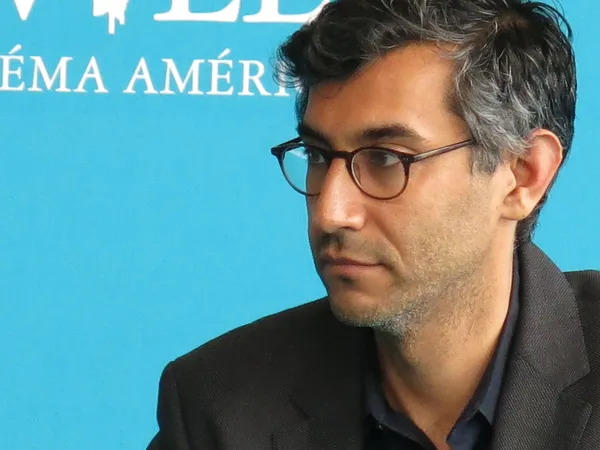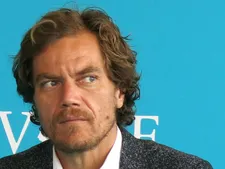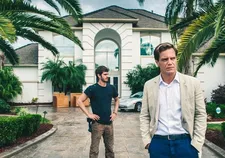 |
| Writer-director Ramin Bahani in Deauville: "This is a global situation and something that everyone can understand:” Photo: Richard Mowe |
Writer-director Ramin Bahani has crafted 99 Homes as a thriller (rather than a social drama) about the housing crisis in which families literally are thrown out on the streets and their homes repossessed. Michael Shannon incarnates a charismatic real estate agent getting rich on the proceeds with recent victim Andrew Garfield becoming his sidekick locked in a Faustian pact. Laura Dern plays Garfield’s mother, trying to hold the family together as well as claiming the moral high ground. Already the film is attracting awards attention and looks set to make the biggest impact of the director’s five films so far. With a Competition slot at the Deauville American Film Festival which continues until Sunday, Bahani (best known for Goodbye Solo in 2008, and Man Push Cart in 2005) gives the lowdown.
Richard Mowe: Although your film is set in Florida it will strike chords everywhere. Do you agree?
 |
| Michael Shannon in Deauville playing a charismatic real estate agent getting rich on the proceeds of the housing crisis. Photo: Richard Mowe |
Rain Bahani: This is a global situation and something that everyone can understand: the markets are rigged by a handful of people at high levels in business and also government. This revolving door is becoming a real issue. So what the film is tapping in to can be felt anywhere from Greece, Italy, Spain, and France to the UK.
RM:You embarked on the research almost in the way of an investigative journalist. Was that beneficial by the time you came to write it?
RB: Real life has so much interesting material. I did a lot of reading around the subject in New York - more than 600 articles - and then I went down to Florida and spent time in the foreclosure courts where they decide your case in 60 seconds. I spent time with real estate brokers and I saw that they all carry guns. I went on evictions and learnt about the scams. I have ten other scams that I did not put in the movie. The foreclosure mills with fraudulent paperwork and people shooting guns in their homes - all these things were based on reality. When I first went to Florida I thought I was going to making a social drama, along the lines of my previous work and more contemplative. But I was startled by what I was seeing: violence, guns and scams. I realised then that it was it to be a thriller mixed with a Faustian story but set in a real social context. That creatively was exciting and not something I had done before. There is a pace to the film that people are surprised by.
RM: How did you integrate your non-professional actors with the real ones?
RB: The sheriff who goes on the evictions is a real sheriff, the clean-out crew are a real clean-out crew and every other person that Andrew evicts is a real person. I would not tell Andrew who was behind the doors and whether they were real people or actors and that brought an added intensity to his performance. The sheriff had done some acting previously but he had always just played a cop with a gun and he had never had a more developed role so he relished the chance. The cop next to him was an actor but he spent a week with the real cop and that grounded his performance. We shot in New Orleans because we could not shoot in Florida for tax credit reasons. People there had lost their homes in hurricane Katrina so they were tapping in to that. I would craft the scenes around who they were.
RM: Do you think that forcing people to watch the reality of the situation will help to change things?
RB: We have all read the statistics but they are just statistics but seeing it all happen is very emotional and real and visceral and most people will know someone to whom this has happened. In the structure of the story what makes it especially startling is this Faustian element. After 45 minutes you are shocked that Andrew is doing this. You have watched it being done to him and then suddenly he is evicting other people . Shannon’s character is becoming innured to it all. This crisis hit middle class people, people with jobs. That lead to those motels which are provided as emergency accommodation almost in the shadow of Disney World. So many kids would be piled in there that they would divert special buses to take them to school. They would be rubbing shoulders with gang bangers and prostitutes and petty hoods.
 |
| Andrew Garfield and Michael Shannon in 99 Homes - Competition entry at the Deauville Festival of American Cinema |
RM: What really happens to these homes once the evictions have taken place?
RB: Brokers like Shannon’s character try to make a profit on them along with the banks. Then you get in to things like bulk buying which is talked about in the film and which is a huge business. Large hedge funds, family funds and foreign funds buy up thousands of empty homes and millions are being invested in these properties. At the moment in the States there is a two decade low in home ownership and we have become a nation of renters with landlords potentially being located in China or Canada. Or it is a hedge fund on Wall Street and you have no idea who it is. These things will lead to more crashes. The world is now so inter-connected and lacks any form of isolation that we are more and more susceptible to a crash. If something happens in say Deauville now it is going to have an impact tomorrow on London, or New York or Tokyo or wherever. The cycle of crashes is going to become more rapid and intense.
RM: Does your Iranian background have an impact on the way you look at the world?
RB: I am sure it does. I was born and raised in North Carolina but my parents are both Iranian and I am grateful to have had two ways of seeing. The film was informed by some of my favourite American authors like Steinbeck and Arthur Miller, and also such films as Wall Street - Michael’s character is a lot like a new version of Gordon Gekko. Actually he even sounds a bit like Donald Trump, who is tapping in to what is deep-seated economic frustration. Trump is like a dormant volcano that has erupted. He is tapping into the way things are right now with people unable to make ends meet.
RM: You seem to be adept at managing to get your films financed. How so?
RB: This is my fifth film and starting from the beginning I took lessons from people that I admired like Werner Herzog who has become a friend. Herzog never waited for anyone - he just did it. I noticed that film-makers I liked also were credited as producers so I figured out that I should not just wait around for someone to hand me a ticket. I am grateful over the years to have found more and more collaborators and people who are interested in working with me. This one came together very quickly, based mainly on the script and the main actors. We gave it to five different potential investors and within 24 hours all five came back and said yes. They were surprised at how fast-paced it was and that it was a genre film. This will be my biggest release so far, and they are spending a lot of money on the awards campaign. It starts in Los Angeles and New York and then expands quickly to several hundred screens. The multiplex chains responded well to it and they think it will have cross-over appeal.
RM: Besides looking after the launch of 99 Homes, what else do you have on your agenda?
RB: We are finishing our fourth collaboration (with co-scriptwriter Amir Naderi), There is also something for HBO and we have a TV series.The next few years are fully booked up. With 99 Homes I had the feeling we were doing something special which I guess if I am lucky will only happen two or three more times in my career.
99 Homes is released in the US and the UK on 25 September.





















